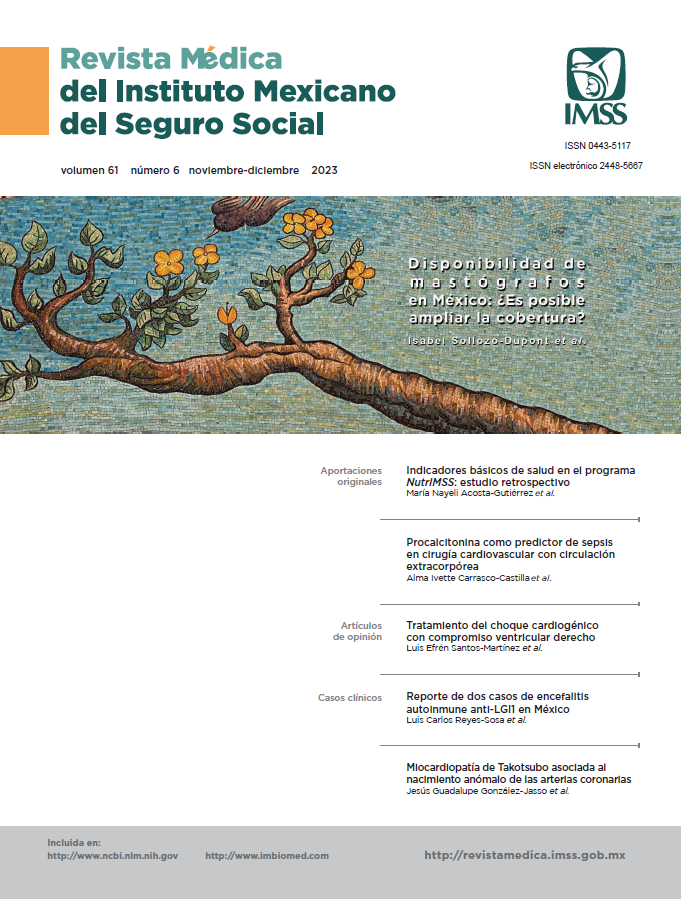Report of two cases of anti-LGI1 autoimmune encephalitis in Mexico
Main Article Content
Keywords
Immunotherapy, Hyponatremia, Cognitive Dysfunction, Limbic Encephalitis, Autoimmune Diseases of the Nervous System
Abstract
Background: Anti-LGI1 encephalitis is characterized by a pattern of inflammation that predominantly affects the limbic system It is part of the autoimmune encephalitis that attack neuronal surface antigens. It is characterized by the triad of subacute dementia, faciobrachial dystonic crises, and hyponatremia, presenting an excellent response to immunotherapy. The aim of this article is to describe the clinical evolution and functional outcome at 6 months of two patients with anti-LGI1 encephalitis using clinical cases.
Clinical classes: Case 1: 62-year-old man with 8-week symptoms manifested by changes in mood, disorientation, and focal motor seizures. Case 2 A 72-year-old woman with a 5-month evolution of rapidly progressive dementia, hyponatremia and bitemporal hyperintensities on MRI. In both, due to clinical suspicion, acute dual immunotherapy with steroid and immunoglobulin was given with substantial improvement. Subsequently, the existence of anti-LGI1 antibodies in cerebrospinal fluid was confirmed. Although both patients received a dose of rituximab during their hospitalization, only the patient in the first case continued biannual doses of rituximab. The second patient was not initially considered to continue long-term immunomodulatory treatment and experienced a relapse.
Conclusions: These clinical vignettes present the reader with the classic characteristics of this disease. This can facilitate its recognition and timely initiation of treatment, improving the functional prognosis of patients.
References
van Sonderen A, Thijs RD, Coenders EC, et al. Anti-LGI1 encephalitis: Clinical syndrome and long-term followup. Neurology. 2016;87(14):1449-56. doi: 10.1212/WNL. 0000000000003173.
Dalmau J, Graus F. Antibody-Mediated Encephalitis. N Engl J Med. 2018;378(9):840-51. doi: 10.1056/NEJMra1708712.
Graus F, Escudero D, Oleaga L, et al. Syndrome and outcome of antibody-negative limbic encephalitis. Eur J Neurol. 2018;25(10):1-9. doi: 10.1111/ene.13661.
Lai M, Huijbers MG, Lancaster E, et al. Investigation of LGI1 as the antigen in limbic encephalitis previously attributed to potassium channels: a case series. Lancet Neurol. 2010;9 (8):776-85. doi: 10.1016/S1474-4422(10)70137-X.
Gadoth A, Pittock SJ, Dubey D, et al. Expanded phenotypes and outcomes among 256 LGI1/CASPR2-IgG-positive patients. Ann Neurol. 2017;82(1):79-92. doi: 10.1002/ana.24979.
Bastiaansen AEM, van Sonderen A, Titulaer MJ. Autoimmune encephalitis with anti-leucine-rich glioma-inactivated 1 or anti-contactin-associated protein-like 2 antibodies (formerly called voltage-gated potassium channel-complex antibodies). Curr Opin Neurol. 2017;30(3):302-9. doi: 10.1097/ WCO.0000000000000444.
Gao L, Liu A, Zhan S, et al. Clinical characterization of autoimmune LGI1 antibody limbic encephalitis. Epilepsy Behav. 2016;56:165-9. doi: 10.1016/j.yebeh.2015.12.041.
Dutra LA, Abrantes F, Toso FF, et al. Autoimmune encephalitis: a review of diagnosis and treatment. Arq Neuropsiquiatr. 2018; 76(1):41-9. doi: 10.1590/0004-282X20170176.
Li TR, Zhang YD, Wang Q, et al. Clinical Characteristics and Long-Term Prognosis of Anti-LGI1 Encephalitis: A Single-Center Cohort Study in Beijing, China. Front Neurol. 2021; 12:1-10. doi: 10.3389/fneur.2021.674368.
López-Chiriboga AS, Siegel JL, Tatum WO, et al. Striking basal ganglia imaging abnormalities in LGI1 ab faciobrachial dystonic seizures. Neurol Neuroimmunol Neuroinflamm. 2017;4(3):1-3. doi: 10.1212/NXI.0000000000000336.
Uy CE, Binks S, Irani SR. Autoimmune encephalitis: clinical spectrum and management. Pract Neurol. 2021;21(5):412-23. doi: 10.1136/practneurol-2020-002567.
van Sonderen A, Petit-Pedrol M, Dalmau J, et al. The value of LGI1, Caspr2 and voltage-gated potassium channel antibodies in encephalitis. Nat Rev Neurol. 2017;13(5):290-301. doi: 10.1038/nrneurol.2017.43.
Seery N, Butzkueven H, O’Brien TJ, et al. Contemporary advances in antibody-mediated encephalitis: anti-LGI1 and anti-Caspr2 antibody (Ab)-mediated encephalitides. Autoimmun Rev. 2022;21(5):103074. doi: 10.1016/j.autrev.2022.103074.
Irani SR, Buckley C, Vincent A, et al. Immunotherapy-responsive seizure-like episodes with potassium channel antibodies. Neurology. 2008;71(20):1647-8. doi: 10.1212/01.wnl. 0000326572.93762.51.
Rodriguez A, Klein CJ, Sechi E, et al. LGI1 antibody encephalitis: acute treatment comparisons and outcome. J Neurol Neurosurg Psychiatry. 2022;9(3):309-15. doi: 10.1136/ jnnp-2021-327302.
Qiao S, Wu HK, Liu LL, ett al. Clinical Features and Long Term Outcomes of Anti-Leucine-Rich Glioma-Inactivated 1 Encephalitis: A Multi-Center Study. Neuropsychiatr Dis Treat. 2021;17:203-12. doi: 10.2147/NDT.S292343.
Li X, Yuan J, Liu L, et al. Antibody-LGI 1 autoimmune encephalitis manifesting as rapidly progressive dementia and hyponatremia: a case report and literature review. BMC Neurol. 2019;19(1):19. doi: 10.1186/s12883-019-1251-4.
Dürr M, Nissen G, Sühs KW, et al. CSF Findings in Acute NM-DAR and LGI1 Antibody-Associated Autoimmune Encephalitis. Neurol Neuroimmunol Neuroinflamm. 2021;8(6):1-15. doi: 10.1212/NXI.0000000000001086.
Seniaray N, Verma R, Ranjan R, et al. Metabolic Imaging Patterns on 18F-FDG PET in Acute and Subacute LGI1 Autoimmune Limbic Encephalitis. Clin Nucl Med. 2021;46(1):e27-8. doi: 10.1097/RLU.0000000000003258.
McQuillan RF, Bargman JM. Hyponatraemia caused by LGI1- associated limbic encephalitis. NDT Plus. 2011;4(6):424-6. doi: 10.1093/ndtplus/sfr105.
de Bruijn MAAM, van Sonderen A, van Coevorden-Hameete MH, et al. Evaluation of seizure treatment in anti-LGI1, anti-NMDAR, and anti-GABABR encephalitis. Neurology. 2019;92 (19):e2185-96. doi: 10.1212/WNL.0000000000007475.
Li W, Wu S, Meng Q, et al. Clinical characteristics and short term prognosis of LGI1 antibody encephalitis: a retrospective case study. BMC Neurol. 2018 Jul 6;18(1):1-8. doi: 10.1186/ s12883-018-1099-z.
Abboud H, Probasco JC, Irani S, et al. Autoimmune Encephalitis Alliance Clinicians Network. Autoimmune encephalitis: proposed best practice recommendations for diagnosis and acute management. J Neurol Neurosurg Psychiatry. 2021;92(7):757-68. doi: 10.1136/jnnp-2020-325300.
Celicanin M, Blaabjerg M, Maersk-Moller C, et al. Autoimmune encephalitis associated with voltage-gated potassium channels-complex and leucine-rich glioma-inactivated 1 antibodies - a national cohort study. Eur J Neurol. 2017;24(8):999-1005. doi: 10.1111/ene.13324.
Wang D, Hao Q, He L, et al. LGI1 antibody encephalitis - Detailed clinical, laboratory and radiological description of 13 cases in China. Compr Psychiatry. 2018;81:18-21. doi: 10.1016/j. comppsych.2017.11.002.
Shin YW, Lee ST, Shin JW, et al. VGKC-complex/LGI1-antibody encephalitis: clinical manifestations and response to immunotherapy. J Neuroimmunol. 2013;265(1-2):75-81. doi: 10.1016/j.jneuroim.2013.10.005.


